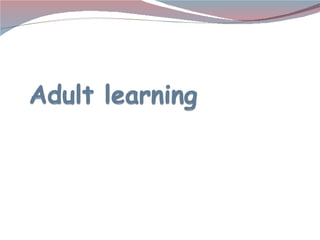
Learn Throughout Life with Adult Learning Principles
- 7. What is adult learning? What else can we call it?
- 11. Can you mention only one example on pedagogical learning?
- 13. What are the differences between the two concepts ; pedagogy and Andragogy?
- 15. Comparing pedagogy and Andragogy assumptions Andragogy pedagogy Adults expect and enjoy independence Children are dependent on teacher and enjoy dependence. Self Concept • They like control, i.e., like to take control. Expects to be taught. Takes no responsibility of teaching self. Learning is a process of sharing with the teacher and one another. Expects teacher to be dominant in determining what, when, and how to be learned. • Teacher has responsibility to encourage and nurture the process of self-direction.
- 16. Comparing pedagogy and Andragogy assumptions Andragogy pedagogy Adult learners need to know why they need to learn something before undertaking to learn it. Children need to know what the teacher teaches in order to pass and get promoted. Material does not need to be “life applicable Need to Know
- 17. Comparing pedagogy and Andragogy assumptions Andragogy pedagogy Have many experiences; therefore, teacher must draw on adult-learner experiences. Children have few experiences relevant to what is being taught; therefore, teacher must create pertinent experiences Experience Trade-off. Anyone in class also could share. Teachers or experts are the transmitters of experience In some areas, students may have more experience than the instructor. Teacher seldom recognize experiences that children do have Elicits 2- and 3-way communication: instructor to student and student to student. Elicits little discussion in class--teacher to student, one-way communication
- 18. Comparing pedagogy and Andragogy assumptions Andragogy pedagogy Adults normally come to class motivated and ready to learn, because they’ve chosen the training. Children are not necessarily ready to learn. Teacher must decide when it is time to learn specific skills or knowledge and tries to create motivation. Readiness to Learn Adults learn in order to cope with real-life tasks We impose uniform curricula on children by classes and age groups Adults do not group by age, sex, but by experience.
- 19. Comparing pedagogy and Andragogy assumptions Andragogy pedagogy Pragmatic—want application today. Children are believed content to study for the future. (“Someday you’ll need this.”) time Perspective Can barely tolerate studying anything that can’t be applied to a task they expect to perform. Children are believed content to only accept knowledge and understanding level, not application level.
- 20. Comparing pedagogy and Andragogy assumptions Andragogy pedagogy Adults and teachers need to be problem or task centered. Children and teachers of children are subject-centered and enjoy being so (1:00 reading, 2:00 math, etc.) Orientation to learning Learning is a process of increasing competence to achieve full potential in life. Learning is a process of acquiring subject matter content to be used at a later time in life.
- 21. Who is Malcolm Knowles?
- 23. How can we apply adult learning principles in training adults?
- 30. What can a trainer do to apply adult learning effectively?
- 31. How can a trainee make the best use of adult learning or training?
- 34. Success is not final, failure is not fatal: it is the courage to continue that counts. ~ Winston Churchill
